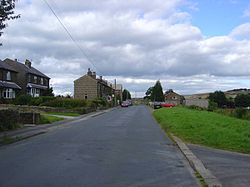Oxenhope
| Oxenhope | |
|---|---|
 Oxenhope, West Yorkshire | |
| Population | 2,626 (2011) |
| OS grid reference | SE032351 |
| Civil parish |
|
| Metropolitan borough | |
| Metropolitan county | |
| Region | |
| Country | England |
| Sovereign state | United Kingdom |
| Post town | KEIGHLEY |
| Postcode district | BD22 |
| Dialling code | 01535 |
| Police | West Yorkshire |
| Fire | West Yorkshire |
| Ambulance | Yorkshire |
| UK Parliament | |
Oxenhope is a village and civil parish with a population of 2,476 near Keighley in the metropolitan borough of Bradford, West Yorkshire, England,[1] increasing to 2,626 at the 2011 Census.[2] Historically part of the West Riding of Yorkshire, Oxenhope railway station is the terminus for the Keighley and Worth Valley Railway.
History
Oxenhope's name derives from the Old English hop which means valley head, so Oxenhope literally means Oxen Valley Head.[3] The industrialisation of the village came about during the cloth and wool trade and by 1850, Oxenhope was host to over 20 mills.
Leeming reservoir was constructed between 1872 and 1873 to supply the many mills in the area. Its construction necessitated the closure and demolition of at least two mills and their associated houses.
The modern village of Oxenhope encompasses what were originally the separate settlements of Uppertown, Lowertown, Leeming and Hawking Stone. The historic hamlets of Marsh and Shaw are also included in the village. The area became known as Oxenhope when the Railway Company named the station serving the area opened the line from Keighley in 1867. Until then, the name Oxenhope referred to a small settlement between the hamlet of Marsh and Haworth.
The street pattern of Oxenhope was much altered when the railway arrived. It had originally been intended that the railway would terminate at Haworth; however the owners of Lowertown Mill in Oxenhope persuaded the railway company to extend the line. It was found impracticable to take the railway as far as Lowertown because of the gradients that would have been required. As a compromise, the railway built a road from its station to Lowertown, appropriately named Station Road. The bridge by which this road crosses Leeming Water is of the same construction as many of the railway's bridges.
Culture
The village hosts a number of annual events including a village show, a beer festival (organised by Keighley and Worth Valley Railway) and a music festival at a village pub.
Each summer the village holds an annual Straw Race. The race was inaugurated in 1976[4] and since then has raised £300,000, for charity, from its participants via sponsorship.[5] Competitors are required to carry a bale of straw (20 kg) 2½ miles (4 km) between five Public Houses in the Oxenhope area and drink a beer in each pub. The last stretch to the Dog & Gun Pub is 1½ miles (2.4 km) uphill, past Leeming Reservoir.[6] Many of the competitors wear fancy dress.
On 6 July 2014, Stage 2 of the 2014 Tour de France from York to Sheffield, passed through the village.[7]
Transport

Road
The A6033 is the main road through the town. It leaves the A629 at Cross Roads and stays quite high up on the east side of the valley, bypassing the town of Haworth and eventually descending into Oxenhope, before going south east over Oxenhope Moor to Hebden Bridge.
Bus
Transdev bus services operate to Oxenhope and beyond on an hourly basis from Keighley via Haworth. some routes travel via Oxenhope Moor to Hebden Bridge.[8]
Rail
Oxenhope is the terminus of the Keighley and Worth Valley Railway. This route was closed by British Rail in 1962; then reopened by a group of volunteers 1968.[9] Trains are often steam hauled and run as a heritage rather than a commuter railway.[10]
Religious sites
There are two Methodist churches in Oxenhope; one in the village and one in Marsh hamlet north west of Oxenhope. Both of these churches are in the Airedale Methodist Circuit.[11] There used to be a Baptist church on Moorside Lane (Hawksbridge Baptist Church) but its congregation dwindled and in 2012 it was put up for sale. The buildings were sold and are to feature on Channel 4's The Restoration Man TV show in early 2016.[12]
The Church of England 19th-century parish church of St Mary the Virgin is on the Hebden Bridge road. It has some interesting glass by the William Morris company. The church was founded by the Reverend Joseph Brett Grant at the behest of the Reverend Patrick Brontë. The Rev Grant was tireless in collecting money to fund the building of the church and Charlotte Brontë records that he wore out 80 pairs of shoes in his quest to do so. The foundation stones of the church were laid down in 1849.[13]
See also
References
- ^ "Census 2001 : Parish Headcounts : Bradford". Office for National Statistics. Retrieved 1 September 2009.
- ^ "Civil Parish population 2011". Neighbourhood Statistics. Office for National Statistics. Retrieved 21 February 2015.
- ^ "Conservation Areas - Leeming & Oxenhope Uppertown" (PDF).
- ^ "Keighley News Oxenhope Straw Race 2014".
- ^ "About | The Oxenhope Straw Race". www.strawrace.com. Retrieved 21 October 2015.
- ^ "Rules & Regulations | The Oxenhope Straw Race". www.strawrace.com. Retrieved 21 October 2015.
- ^ "Tour de France Stage 1". Retrieved 15 July 2014.
- ^ "Transdev Keighley & district route 500" (PDF).
- ^ "History | KWVR - Keighley & Worth Valley Railway". KWVR - Keighley & Worth Valley Railway. Retrieved 21 October 2015.
- ^ "Worth Valley Railway Timetable".
- ^ "Welcome to the Airedale Circuit | Airedale Circuit". www.airedalemethodists.org. Retrieved 22 October 2015.
- ^ "Oxenhope's former Hawksbridge Baptist Chapel to feature in Restoration Man TV show". Keighley News. Retrieved 22 October 2015.
- ^ "Oxenhope, West Yorkshire - St.Mary the Virgin - History". www.thesunflowertrust.org.uk. Retrieved 22 October 2015.
External links
